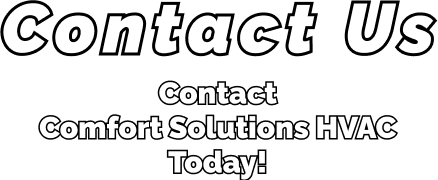Insights from Your Home Comfort Specialists in Easton, PA
While summer is all about enjoying the warm weather, hikes, picnics, barbecues, and a host of family outings, at the end of the day, you want to come back to a cool and comfortable home. Did you know that our perception of hot or cold is a factor in the percentage of humidity in the air? Any imbalance in the humidity levels not only impacts your home’s heating or cooling but is also an indication of your HVAC system not functioning properly.
At Comfort Solutions HVAC, we understand that home cooling issues can be tiresome and frustrating, especially in the peak of summer. Our specialists explain the consequences of high humidity in your home, and possible solutions to address this issue.
How Humidity Affects Your Air Conditioning System
One of the primary purposes of your Air Conditioning (AC) system is to reduce the moisture in the air and maintain humidity levels between 35 and 45 percent, irrespective of the outdoor weather conditions. If the humidity levels are above this range, your indoor air quality will suffer, even if the ambient temperature reaches the level that you have set on your thermostat. Essentially, this means your AC is not functioning as efficiently as it should.
If the humidity levels in your home are higher than the recommended range, you will notice one or more of these signs:
- Dampness in the air, resulting in a sticky and muggy indoor environment
- Signs of condensation, such as foggy windows or glass doors
- Musty or unpleasant odors in some parts of the home
- Peeling paint or wet patches on ceilings, walls, wood floors, carpets, trims, or other structural elements
- Moldy growth in the bathrooms
- Worsening of allergies and chronic conditions, such as asthma, bronchitis, or other respiratory issues
How to Address High Humidity Levels in Your Home
Proper sizing of the AC unit plays an important role in its effectiveness. Excess capacity could mean that your system cools the home to the thermostat’s target temperature very quickly. However, the shorter cooling cycles do not allow for adequate time to dehumidify the air. Hence, your home may feel cool, but the retained moisture will impact your home’s structural elements, as well as the quality of the indoor air.
On the other hand, an undersized AC or heat pump will struggle to cool your home, especially on days when the outdoor temperatures and humidity levels are very high. The capacity mismatch and longer running cycles will cause your energy bills to spike, while the indoor temperature may still not reach the desired levels.
Besides right-sizing your HVAC unit, here are some ways to get rid of excess humidity in your home:
- Ensure that your ductwork is properly sealed and insulated and that the clothes dryer is vented outdoors.
- Use exhaust fans in kitchens and bathrooms to eliminate moisture caused by showers or cooking.
- Add a dehumidifier to your HVAC system to reduce the load on the system and help it maintain optimum levels of moisture in the air. This will also prevent your energy bills from skyrocketing.
- Clean out the HVAC system’s drain line at regular intervals. This is part of the preventative maintenance activities carried out by professional home comfort specialists.
Notice any of the signs of excess humidity in your home? Need to replace, repair, or service your air conditioning system? For prompt and affordable, residential heating and cooling solutions throughout Eastern PA and the surrounding areas of NJ, rely on the professionals at Comfort Solutions HVAC. Our skilled technicians will evaluate your air conditioning system and offer appropriate solutions to improve the air quality, as well as keep your home cool and comfortable.
Don’t let excess humidity spoil port in your home’s comfort. Schedule an AC servicing appointment or get a free estimate today. Call us at 610-477-2210 or contact us online.






